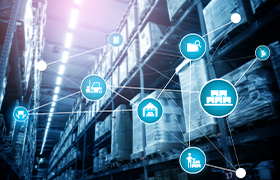
Smart Retail Adoption Trends in the Retail Industry

Brick and mortar retail stores are facing heavy competition due to the growing significance and adoption of online shopping, making it necessary to explore and invest in in-store technologies that will attract more customers. Smart retail systems involve connectivity, integration, RFID, interactive kiosk, facial recognition, and big data analytics. Increasing focus on shopper data insights drives the growth of smart retail market. The growing use of automation and big data analytics to gain shopper insights and improve customer engagement is expected to drive the market.
Currently, the market is dominated by small niche suppliers. In the future, global suppliers who can bundle and provide all digital display components will emerge. The cost of such technology is expected to reduce in the next five years with its increasing adoption.
Introduction
The global smart retail market was estimated at $12-13 billion in 2018 and is forecasted to reach $40-50 billion by 2023. North America holds the largest market share, and market size for 2018 was estimated to be $4-5.5 billion. The Asia-Pacific region is expected to have the highest CAGR in the global smart retail market.
Smart Retail Adoption: Retailer Initiatives
1. JD.com partnership with Intel—JD and Intel have planned to set up a lab focused on bringing the Internet of Things (IoT) technology into the retail process, including smart vending machines. The plan is to use the technology in stores of the future based on Intel’s architecture. JD also intends to utilize technologies like facial recognition for customer access into its stores, and fully automated payments. These stores will be opened to coexist alongside JD’s high-tech 7Fresh supermarket chain.
2. Amazon Go, U.S.—The store incorporates machine vision, AI, and sensor technology to allow shoppers to pick their items by using the Amazon Go app, which automatically charges customers’ Amazon accounts for those items.
3. Alibaba—It has adopted retail automation in its Hema stores as well as various other technologies like mobile payment, augmented reality (AR), and QR codes. L’Oréal has also partnered with Alibaba for a connected mirror that allows customers to shop directly on TMall for makeup products based on the looks selected by the consumer.
4. L’Oréal has acquired beauty tech company Modiface to implement a range of personalized products, connected devices, as well as beauty services driven by AR and AI.
5. Walmart’s Intelligent Retail Lab is testing AI-enabled cameras and interactive displays in a real store containing over 30,000 items in New York. This is expected to be deployed across the country in the future.
Related Insights:
View All
Get more stories like this
Subscirbe for more news,updates and insights from Beroe






